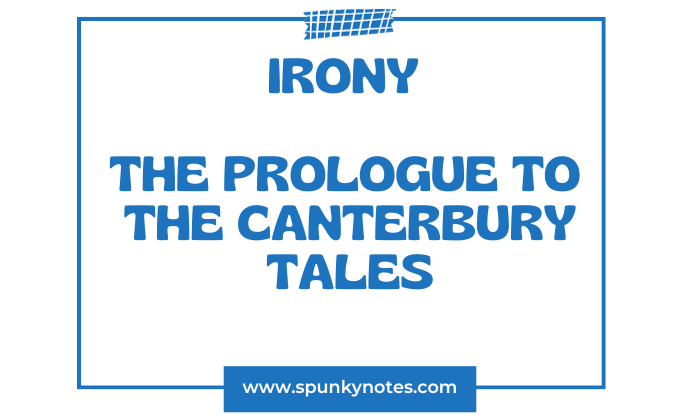

Estimated Reading Time: 8 min
Q. Discuss the use of irony in The Prologue to the Canterbury Tales.
Irony
Irony is a clever literary tool that Geoffrey Chaucer skillfully uses in The Prologue to the Canterbury Tales. It is saying one thing but meaning another, often for humor or to make a point. Chaucer employs various forms of irony in this famous poem.
Chaucer employed irony in the frame narrative of “The Prologue to the Canterbury Tales” in the following ways:
Verbal Irony: Chaucer uses verbal irony to highlight the contrast between the stated purpose of the pilgrimage—to visit the shrine of Thomas Becket in Canterbury—and the behavior and motives of some of the pilgrims.
Many pilgrims claim to be devout and pious individuals, yet their actions and tales often reveal their moral shortcomings. For example, the Pardoner, who sells indulgences and preaches against greed, is greedy.
Situational Irony: Situational irony can be seen in the discrepancy between the religious nature of the pilgrimage and the worldly concerns and flaws of the pilgrims.
The fact that they embark on a religious journey but often engage in sinful or hypocritical behavior during the journey creates situational irony. The contrast between the sacred and the profane is a source of irony in the poem.
Dramatic Irony: Dramatic irony is present when the audience knows something that the characters within the story do not. In “The Prologue to the Canterbury Tales,” the reader may better understand the true nature of some of the pilgrims through Chaucer’s descriptions and tales.
At the same time, the other characters in the story remain unaware. This dramatic irony can create a sense of humor and engagement for the readers.
Irony in the Description of Characters
The Knight
The Knight is portrayed as a noble and honorable figure, the epitome of chivalry. However, it is ironic that a man dedicated to war and combat, who has participated in numerous battles, is considered the paragon of virtue.
Chaucer writes,
A KNYGHT ther was, and that a worthy man,
A KNIGHT there was, and that (one was) a worthy man,
That fro the tyme that he first bigan
Who from the time that he first began
To riden out, he loved chivalrie,
To ride out, he loved chivalry,
Trouthe and honour, fredom and curteisie.
Fidelity and good reputation, generosity and courtesy.
The irony lies in the contrast between the Knight’s martial exploits and the traditional ideals of chivalry.
The Squire
The Squire, the Knight’s son, is young and handsome, dedicated to courting women and composing love songs. It is ironic because a knight’s son is expected to follow in his father’s footsteps as a warrior.
Chaucer notes,
With hym ther was his sone, a yong SQUIER,
With him there was his son, a young SQUIRE,
A lovyere and a lusty bacheler,
A lover and a lively bachelor,
With lokkes crulle as they were leyd in presse.
With locks curled as if they had been laid in a curler.
Of twenty yeer of age he was, I gesse.
He was twenty years of age, I guess.
There is irony in the Squire’s focus on romance rather than the chivalric pursuits one would expect.
The Prioress
The Prioress is supposed to lead a life of religious devotion and humility, but her ironic vanity is evident in her extravagant jewelry and fastidiousness.
Chaucer writes,
Ful fetys was hir cloke, as I was war.
Her cloak was very well made , as I was aware.
Of smal coral aboute hire arm she bar
About her arm she bore of small coral
A peire of bedes, gauded al with grene,
A set of beads, adorned with large green beads,
And theron heng a brooch of gold ful sheene,
And thereon hung a brooch of very bright gold,
It is ironic that her excessive concern is with appearances rather than spirituality.
The Monk
The Monk is another character who deviates from his expected religious role. He is supposed to live a life of austerity and contemplation but indulges in worldly pleasures like hunting.
Chaucer notes,
I seigh his sleves purfiled at the hond
I saw his sleeves lined at the hand
With grys, and that the fyneste of a lond;
With squirrel fur, and that the finest in the land;
The irony lies in the Monk’s extravagance and disregard for his monastic duties.
Hunting a hare or riding at a fence
Was all his fun, he spared for no expense.
This highlights the Monk’s interest in worldly pleasures, in sharp contrast to the monastic vows of poverty and simplicity.
The Friar
The friar is meant to be compassionate, offering solace to people with low-income and needy. However, he is more interested in collecting money from people for his own gain.
Chaucer writes,
Is signe that a man is wel yshryve;
Is a sign that a man is well confessed;
For if he yaf, he dorste make avaunt,
For if he gave, he (the friar) dared to assert,
The irony is that the Friar’s actions contradict his supposed role of helping the less fortunate.
The Pardoner
The Pardoner is the most ironic character in the group. Even though he promotes the evils of greed and sells indulgences, avarice is his only driving force.
Chaucer writes,
A vernycle hadde he sowed upon his cappe.
He had sewn a Veronica upon his cap.
His walet lay biforn him in his lappe
Before him in his lap, (he had) his knapsack
The irony lies in the Pardoner’s hypocrisy and greed.
The Wife of Bath
The Wife of Bath is a character who claims to have great wisdom about marriage due to her extensive experience with five husbands.
However, it is ironic that she still cannot find a perfect husband, and her marriages have not brought her lasting happiness.
Chaucer writes,
Housbondes at chirche dore she hadde fyve.
She had (married) five husbands at the church door,
The irony is in her continued quest for marital bliss despite her past failures.
The Miller
The Miller is a burly and boisterous character who cheats his customers by stealing grain while operating a mill. He is also fond of telling bawdy stories.
The irony is that someone supposed to be trustworthy in handling people’s grain is dishonest and lewd. Chaucer writes,
That proved wel, for over al ther he cam,
That was well proven, for wherever he came,
At wrastlynge he wolde have alwey the ram.
At wrestling he would always take the the prize.
Miller’s love for wrestling and always wanting to win “the ram” (a symbol of victory) is ironic because it emphasizes his brute strength and competitiveness rather than piety or humility, qualities expected of a pilgrim.
In “The Prologue to the Canterbury Tales,” Chaucer employs irony to highlight the discrepancies between the pilgrims’ outward appearances and their true natures, offering a satirical commentary on the complexities of human behavior and society during his time.
The Summoner
The Summoner is responsible for summoning sinners to church court. However, he is corrupt, accepting bribes and engaging in immoral behavior.
Chaucer writes,
And knew hir conseil, and was al hir reed.
A garland hadde he set upon his heed,
As greet as it were for an ale-stake
A bokeleer hadde he maad hym of a cake.
The irony is that a man in his position should be virtuous, but he is morally compromised.
The Host (Harry Bailey)
The host is the one who proposes the storytelling contest on the pilgrimage to Canterbury. He is depicted as a jovial and fair-minded character, but ironically, he suggests this competition as a way to pass the time during a religious journey.
The irony lies in the juxtaposition of the religious pilgrimage and the competitive storytelling.
The Cook
The Cook is known for his culinary skills, but he has an ulcer on his knee that leaks pus. This is ironic because a cook should be associated with cleanliness and hygiene, yet he is afflicted with a disgusting ailment.
Chaucer writes,
But greet harm was it, as it thoughte me,
But it was a great harm, as it seemed to me,
That on his shyne a mormal hadde he.
That he had an open sore on his shin.
In “The Prologue to the Canterbury Tales,” Geoffrey Chaucer employs irony in characterizing various pilgrims to highlight their contradictions, hypocrisies, and unexpected qualities.
With this irony, Chaucer comments on the multifaceted nature of human behavior and social norms in medieval England.


